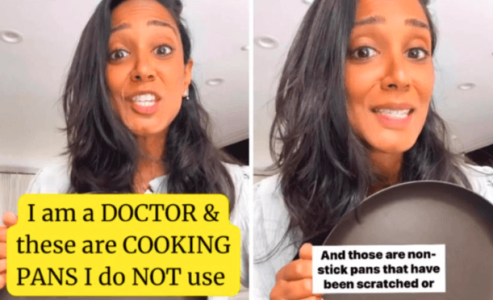This kitchen item could harm your health, according to a doctor–and you probably use it every day!
- Replies 13
We like to think of ourselves as pretty practical people. When it comes to kitchenware, for example, we want to pick items that get the job done–and fast!
Non-stick cooking pans qualify as such, with their plentiful ergonomic features and convenient, easy-to-clean surfaces. Can you blame us for preferring them over heavy, complicated cast iron pans–especially those that take forever to get properly seasoned?
If you've ever found yourself grappling with making eggs in a stainless-steel pan or giving up on numerous failed crêpes, you're already familiar with the vital role that non-stick pans play in any kitchen.
Unfortunately, it turns out that as handy as non-stick pans may be, there is an important reason why we should stay away from them–one that could potentially harm our health.

Doctor and mum Poonam Desai recently took to social media to reveal the health hazards of using non-stick and aluminium-based ceramic pans.
'Scratched or chipped non-stick cooking pans can leech millions of microplastics into our food,' she said in a video she posted on her social media account.
'Microplastics are endocrine disruptors. They can cause hormone imbalances, fertility issues and even increase our risk of cancer.'
Ceramic pans are also a no-go in Desai's book. 'Ceramic pans usually have a layer of aluminium underneath, and it can leach into our foods,' she warned.
'If people have scratched non-stick or aluminium-based ceramic pans at home, they should throw them out,' she said.
The doctor's video, unsurprisingly, caused a bit of a stir online, scoring both praise and criticism from social media users.
One supporter thanked her for the useful advice, saying, 'I threw out all my pans long ago. Please watch [the doctor's video] and do the same! Cast iron for the win!'
Others weren't so thrilled, with one commenter calling the health warning 'classic fear mongering'.
'I'm so tired of seeing video after video that is basically telling everything I'm doing in my life is just killing me or causing cancer…' said one commenter, adding: 'This is so annoying.'
In October 2022, a team of Australian researchers identified millions of plastic particles that had been released from non-stick pots and pans that had been damaged.
Professor Youhong Tang from Flinders University led the study, emphasising the importance of understanding the potential risks posed by plastic waste during everyday cooking activities.
'It gives us a strong warning that we must be careful about selecting and using cooking utensils to avoid food contamination,' he said.
'More research is recommended to address the risk assessment of microplastics and nanoplastics.'

So, what's the truth? Should we just throw out our non-stick pans once they're chipped or scratched?
Unfortunately, the jury is still out. That said, erring on the side of caution is not unreasonable.
Although chipped or scratched non-stick pans might not pose immediate safety risks, it might be a good idea to avoid using them. After all, bits of the non-stick coating could end up in your food, which isn't appetising at all.
These scratches can also have an impact on the pan's non-stick performance. Over time, scratches, exposure to high heat, and regular usage gradually erode the smooth, non-stick layer on the pan's surface, making food more prone to sticking to the pan.
Depending on how often you cook with it and how well you care for it, a new non-stick pan might lose its effectiveness within just a year or two.
Unlike cookware crafted from materials like cast iron or stainless steel, non-stick pans aren't designed for long-term use. If your non-stick pan already has noticeable scratches, it's a sign that it's time to replace it.
We delved further into this topic and discussed other kitchenware in a previous article, so feel free to look.
We hope you found this article helpful, members! So, what do you think? Do you regularly use non-stick pans at home? Or do you prefer cast iron or stainless steel kitchenware? Let us know in the comments below!
Non-stick cooking pans qualify as such, with their plentiful ergonomic features and convenient, easy-to-clean surfaces. Can you blame us for preferring them over heavy, complicated cast iron pans–especially those that take forever to get properly seasoned?
If you've ever found yourself grappling with making eggs in a stainless-steel pan or giving up on numerous failed crêpes, you're already familiar with the vital role that non-stick pans play in any kitchen.
Unfortunately, it turns out that as handy as non-stick pans may be, there is an important reason why we should stay away from them–one that could potentially harm our health.

A doctor has warned that cooking with non-stick pans with scratches or chips can do more harm than good. Credit: Instagram/doctoranddancer.
Doctor and mum Poonam Desai recently took to social media to reveal the health hazards of using non-stick and aluminium-based ceramic pans.
'Scratched or chipped non-stick cooking pans can leech millions of microplastics into our food,' she said in a video she posted on her social media account.
'Microplastics are endocrine disruptors. They can cause hormone imbalances, fertility issues and even increase our risk of cancer.'
Ceramic pans are also a no-go in Desai's book. 'Ceramic pans usually have a layer of aluminium underneath, and it can leach into our foods,' she warned.
'If people have scratched non-stick or aluminium-based ceramic pans at home, they should throw them out,' she said.
The doctor's video, unsurprisingly, caused a bit of a stir online, scoring both praise and criticism from social media users.
One supporter thanked her for the useful advice, saying, 'I threw out all my pans long ago. Please watch [the doctor's video] and do the same! Cast iron for the win!'
Others weren't so thrilled, with one commenter calling the health warning 'classic fear mongering'.
'I'm so tired of seeing video after video that is basically telling everything I'm doing in my life is just killing me or causing cancer…' said one commenter, adding: 'This is so annoying.'
In October 2022, a team of Australian researchers identified millions of plastic particles that had been released from non-stick pots and pans that had been damaged.
Professor Youhong Tang from Flinders University led the study, emphasising the importance of understanding the potential risks posed by plastic waste during everyday cooking activities.
'It gives us a strong warning that we must be careful about selecting and using cooking utensils to avoid food contamination,' he said.
'More research is recommended to address the risk assessment of microplastics and nanoplastics.'
Key Takeaways
- Dr Poonam Desai said she refuses to cook with non-stick pans due to health concerns.
- Scratched or chipped non-stick and ceramic cooking pans can leech microplastics or aluminium into food, potentially causing hormone imbalances, fertility issues and increased cancer risk.
- The doctor advised those with scratched non-stick or aluminium-based ceramic pans at home to throw them out.
- The doctor's advice has received a mixed reaction online, with some praising her advice and others accusing her of 'fear mongering'.
So, what's the truth? Should we just throw out our non-stick pans once they're chipped or scratched?
Unfortunately, the jury is still out. That said, erring on the side of caution is not unreasonable.
Although chipped or scratched non-stick pans might not pose immediate safety risks, it might be a good idea to avoid using them. After all, bits of the non-stick coating could end up in your food, which isn't appetising at all.
These scratches can also have an impact on the pan's non-stick performance. Over time, scratches, exposure to high heat, and regular usage gradually erode the smooth, non-stick layer on the pan's surface, making food more prone to sticking to the pan.
Depending on how often you cook with it and how well you care for it, a new non-stick pan might lose its effectiveness within just a year or two.
Unlike cookware crafted from materials like cast iron or stainless steel, non-stick pans aren't designed for long-term use. If your non-stick pan already has noticeable scratches, it's a sign that it's time to replace it.
We delved further into this topic and discussed other kitchenware in a previous article, so feel free to look.
We hope you found this article helpful, members! So, what do you think? Do you regularly use non-stick pans at home? Or do you prefer cast iron or stainless steel kitchenware? Let us know in the comments below!







